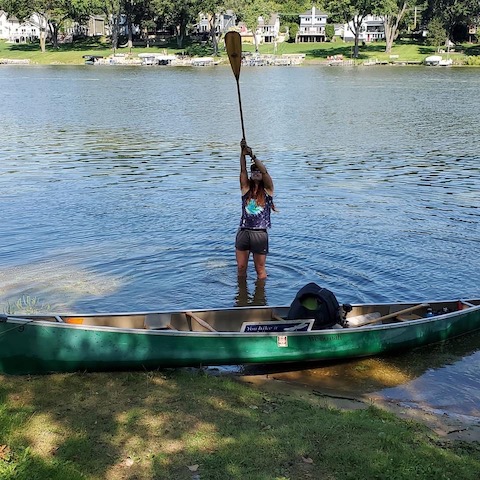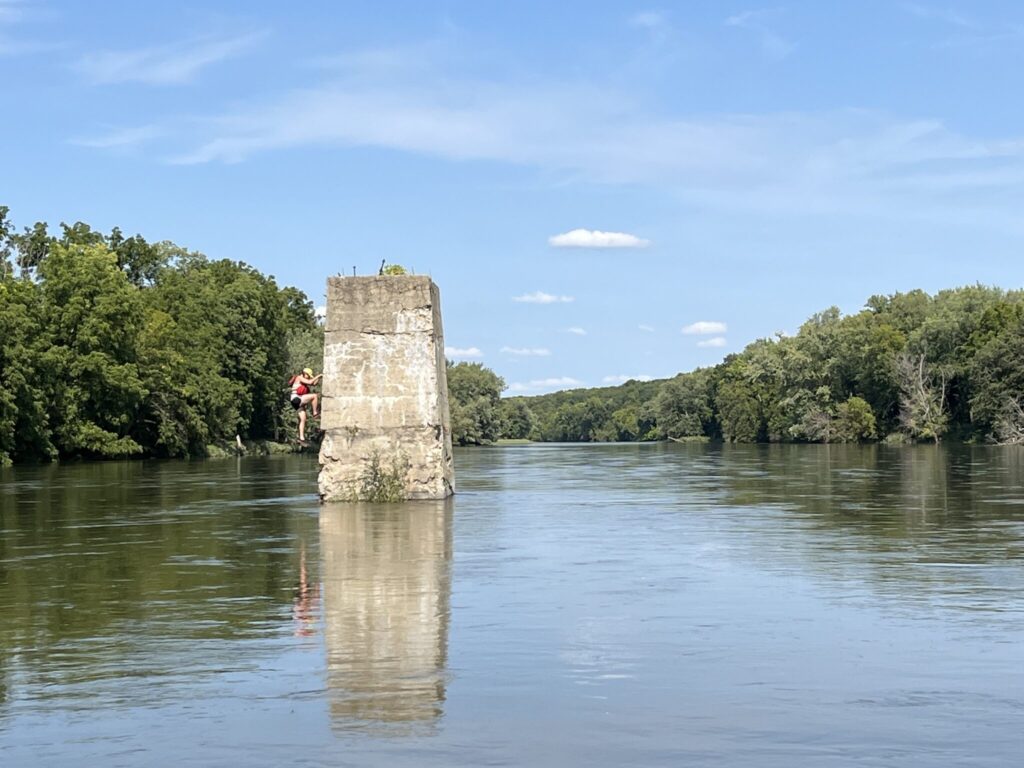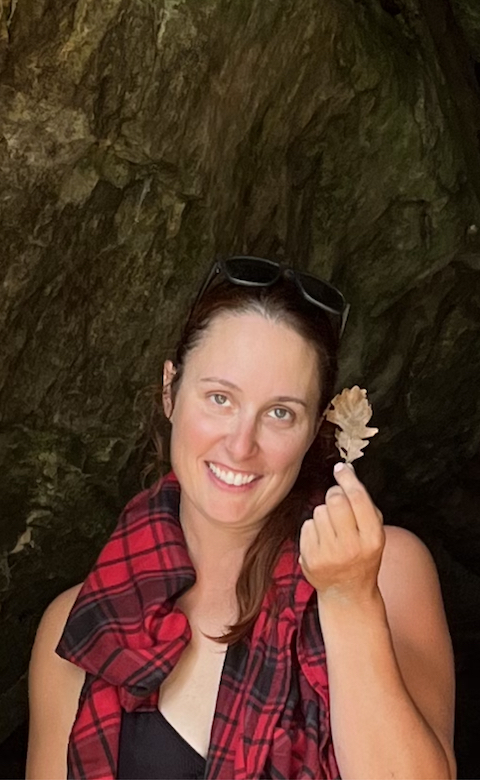“Where did you say you launched from?” asked the owner of a canoe outfit and hangout a few miles from the end of the Fox River.
“Menominee Falls, WI, close to the headwaters. I watched for where the river became navigable and dropped my canoe at the nearest road crossing,” I replied between bites of pizza.
He paused, then said with a smile, “So there still are crazy people.”
I pitched the crazy idea to paddle the full-length of the Fox River to my colleagues at Friends of the Fox River (FOTFR) in January 2022. It was a good thing I started planning it early because coordinating it was no easy task. I decided to do the trip in conjunction with It’s Our Fox River Day in September as a way to raise awareness for the event and to promote our organization in areas outside of the central watershed which naturally gets so much of our attention. From borrowing gear, coordinating childcare, organizing shuttles, and planning the itinerary, nearly 30 people were part of the trip or support system. My trip mentors were FOTFR Board member Chuck Roberts and Charlie Zine who completed their full-length river paddle in 2018.
The trip took roughly ten days to complete, launching on 9/8 and finishing on 9/18. There were unique challenges every day. For instance, near the headwaters outside of Menominee Falls, WI the river is narrow, shallow, and brushy. My paddle partner and I spent as much time outside of the canoe as in, portaging over or around logs. Though traveling was arduous, the water was completely clear. We were watching giant fish, turtles, and invertebrates in their natural environment as though it were an aquarium, a Fox River first for me.
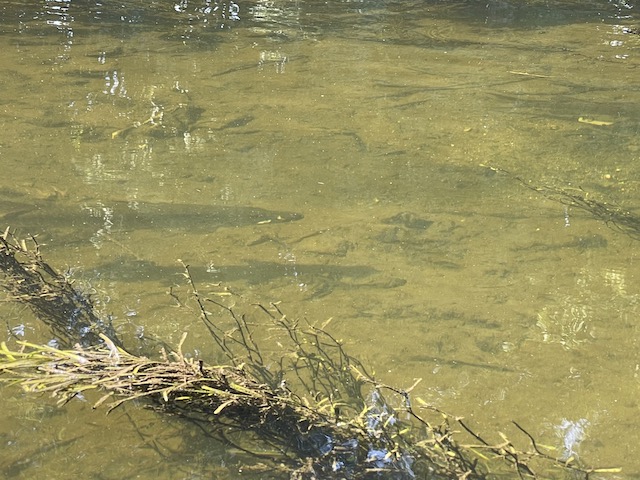
think they were probably muskie or possibly short-nosed gar. What do you think?
Besides deadfall, we experienced harsh headwinds in impoundments, intense rain, sketchy camping, substantial waves, powerboats, ridiculous dam portages, and intimidating, leaping invasive fish. On the flip side we had days free from traffic noise, wildlife constantly soaring above or splashing below, hangout caves inside sandstone bluffs, guitar, sunshine and good times. We learned as many lessons about life as we did about the river.
Only Humans Harm Rivers
Some stretches of river are relatively untouched by humans, save the occasional respectful angler. The reality, though, is that most Fox River miles have been completely altered by people. Dams and channelization change the shape of the river from narrow and winding to wide and straight. Stormwater inputs, combined wastewater overflow, agricultural runoff, and litter threaten water quality and wildlife habitat. My partners and I saw it all.
The quantity of litter increased and decreased proportionally to the distance between population centers. By far, the most common litter item retrieved was single-use plastic water bottles.
The crew and I spent part of each day doing litter removal, clearing items that were snagged in trees lying in the river. At breaks and dam portages we cleaned up as park patrons stood by and watched. We had conversations along the way with residents and river users about how dangerous litter is for wildlife. In fact, we saw a goose that was hanging dead entangled in fishing line and wrapped around an electrical wire, another (shuddering) Fox River first for me.
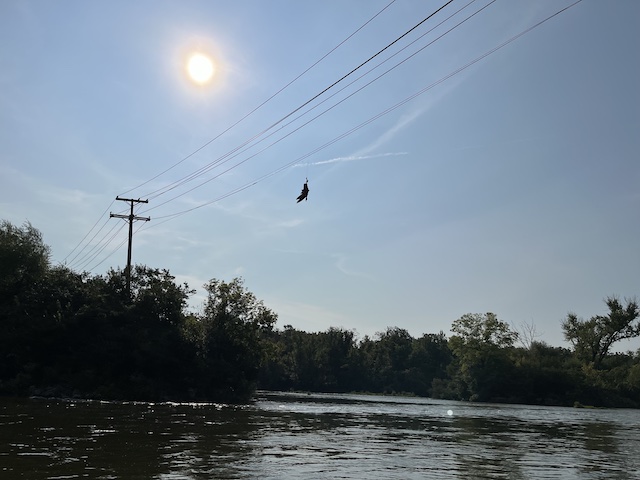
and wrapped around an electrical wire.
Portage Days
There are 16 total Fox River dams, but the obnoxious abundance of them doesn’t fully hit home until the river miles between Elgin and Aurora. Between river mile 71 at the Kimball dam in Elgin and river mile 46 just south of Aurora are 7 dams, none of which are serving their original purpose. Ease of portage varies widely and some of them are truly unsafe, most notably St. Charles and Aurora. The St. Charles portage required traversing parking lots, curbs, and crossing a highway because there is no safe course. Dropping in on the other side was no cake walk either, with large ankle-breaker rocks piled up on a moderate slope requiring paddlers to lift their boats into the water while dangerously balancing on the unstable footing. Portaging around the Aurora dam requires a hefty lift to get up to a paved path. Also at this dam is a dangerous concrete channel called a “canoe chute.” Though a sign indicated it was closed, boats could still get through and consequently get forced into a chain draped across a narrow concrete opening that spilled into a concrete box below filled with raging river water.
The legacy of these dams is danger, reduced water quality, and decreased habitat. Dams replace clear water, flowing over rocks with murky, stagnant water and a bottom coated in sediment. Friends of the Fox River is hard at work developing educational materials and speaking to residents about river restoration via dam removal. If you have questions about the dam in your own community, please reach out to us at info@friendsofthefoxriver.org
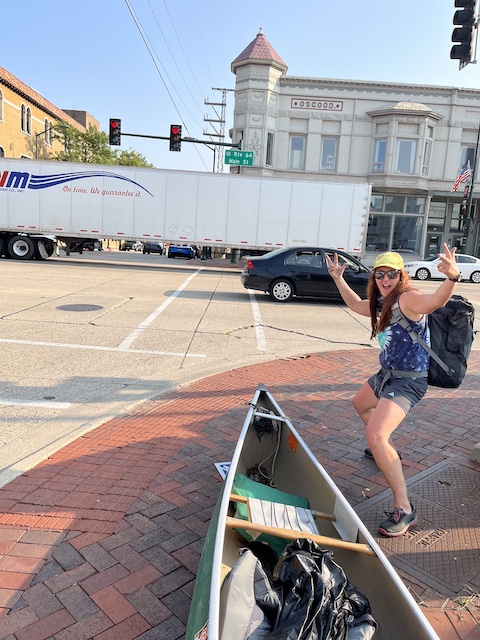
Highway 64 in St. Charles with her canoe in traffic.
Only Humans Can Help Rivers
Completing this trip is motivating my work life on a daily basis. We have documented litter hotspots that will help next year’s It’s Our Fox River Day organizers know where to focus their efforts. I’ve gained geographical context about where agricultural outreach is needed the most. You already heard some of my thoughts about the dams in this central watershed homestretch; if you want the unedited version, join me for a cup of coffee sometime- ha.
The biggest takeaway was realizing how healthy and happy I felt when I was out there. Paddling is a health-promoting activity and a great way to deeply connect with our Fox River. I have great context about ways to share the paddling experience with others, on a smaller, less crazy scale, of course. You love what you know and you protect what you love, right? Stay tuned for group paddling opportunities in 2023 and beyond.
The Oak Leaf Wish
A dear friend of mine told me that when leaves fall from trees it’s the moment they have been waiting for their whole lives. We are all the audience members of this grand performance. He says if you catch a leaf on its climactic descent, make a wish. On day 9 I got that opportunity when a humble, brown oak leaf landed in my hand. My partner and I were inside a Fox River Cave, savoring the setting as the earliest fall leaves blew out of the trees from the sandstone bluff above. I knew my wish to continue cultivating joyous experiences in nature for myself and for others was the right wish for that moment.
These roaring 2020’s have been a wavy ride thus far, as trying as the chop on the Chain O’Lakes when you are a lowly paddler. Despite grave challenges some of us have faced individually and collectively, I have heard remarks from countless peers about how changes that became circumstantially necessary led to ‘doing what they have always wanted to do.’ To that I say “YOLO” (you only live once). Let’s end this river tale with some lines of a poem I wrote for the pondering while you are out there wandering:
We only have one life.
One leaf on a tree
We all fall when it’s our time
And the snow shall cover thee.

